also, too, either, as well的区别
also too either as well的区别和用法
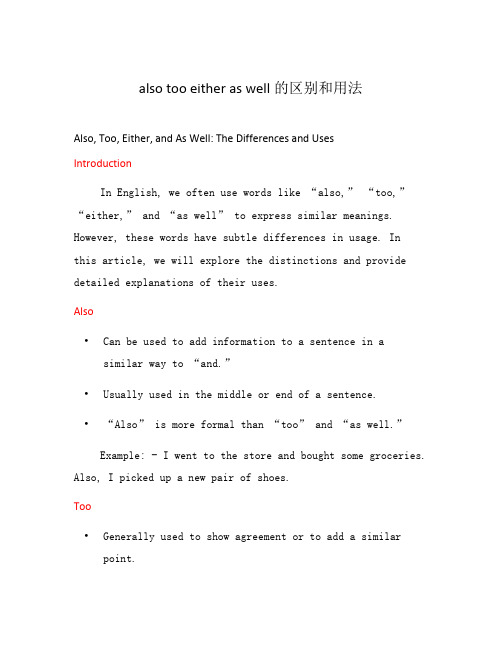
also too either as well的区别和用法Also, Too, Either, and As Well: The Differences and UsesIntroductionIn English, we often use words like “also,” “too,” “either,” and “as well” to express similar meanings. However, these words have subtle differences in usage. Inthis article, we will explore the distinctions and provide detailed explanations of their uses.Also•Can be used to add information to a sentence in a similar way to “and.”•Usually used in the middle or end of a sentence. •“Also” is more formal than “too” and “as well.”Example: - I went to the store and bought some groceries. Also, I picked up a new pair of shoes.Too•Generally used to show agreement or to add a similar point.•Used at the end of a sentence, following the subject. •Has a less formal tone compared to “also” and “as well.”Example: - She is going to the party tonight. I’m going too.Either•Used in a negative or alternative context.•Followed by “or” when presen ting a choice between two options.•Used when presenting options that are mutually exclusive.Example: - I don’t eat chocolate. I don’t like it either.As Well•Similar to “also” and “too” in meaning but is less commonly used.•Usually used at the end of a sentence.•Has a more formal tone than “too.”Example: - He plays the guitar. He sings as well.Summary•“Also” is formal, used to add information.•“Too” shows agreement or similarity.•“Either” presents negative or alternative op tions. •“As well” is a formal alternative to “also” and “too.”Remember, understanding the nuances of these words will help you convey your thoughts more accurately and effectively in English. Practice using them in various contexts to become more proficient in their usage.Additional Uses and ExamplesNow, let’s delve deeper into the uses of “also,” “too,” “either,” and “as well” by providing more examples and explanations.Also•“Also” can be used to add information to a sentence, similar to “and.”–Example: She loves to dance. She also enjoyspainting.•It is often used in the middle or end of a sentence.–Example: He studied hard for the exam. He also attended review classes.•“Also” is more formal than “too” and “as well.”–Example: She is not only talented but alsohardworking.Too•“Too” is used to show agreement or to add a similar point.–Example: Sarah is coming to the party. I’m coming too.•It is usually used at the end of a sentence, following the subject.–Example: I like ice cream too.•“Too” has a less formal tone compared to “also” and “as well.”–Example: He loves football too.Either•“Either” is used in a negative or alternative context.–Example: I don’t eat meat. I don’t eat fisheither.•It is followed b y “or” when presenting a choice between two options.–Example: You can either go to the movies or stay at home.•“Either” is used when presenting options that are mutually exclusive.–Example: You can either come with us or stay here alone.As Well•“As well” is similar in meaning to “also” and “too,”but it is less commonly used.–Example: They are talented singers. They are actors as well.•It is usually used at the end of a sentence.–Example: We will be attending the conference. We will be presenting our research as well.•“As well” has a more formal tone than “too.”–Example: He can swim. He can dive as well.ConclusionIn conclusion, while “also,” “too,” “either,” and “as well” have similar meanings, they have distinct uses and nuances. Understanding their differences will enable you to express yourself more precisely in English. Remember to practice using these words in various contexts to enhance your fluency and accuracy in conveying your ideas.。
also, too, either, as well的区别

also, too, either, as well的区别(最新版)编制人:__________________审核人:__________________审批人:__________________编制单位:__________________编制时间:____年____月____日序言下载提示:该文档是本店铺精心编制而成的,希望大家下载后,能够帮助大家解决实际问题。
文档下载后可定制修改,请根据实际需要进行调整和使用,谢谢!并且,本店铺为大家提供各种类型的经典范文,如词性大全、句法大全、句型大全、从句大全、时态大全、语态大全、语法大全、虚拟语气、用法辨析、其他资料等等,想了解不同范文格式和写法,敬请关注!Download tips: This document is carefully compiled by this editor.I hope that after you download it, it can help you solve practical problems. The document can be customized and modified after downloading, please adjust and use it according to actual needs, thank you!In addition, this shop provides you with various types of classic sample essays, such as part of speech, syntax, sentence pattern, clause, tense, voice, grammar, subjunctive, usage analysis, other materials, etc. If you want to know the different formats and writing methods of the model essay, please pay attention!also, too, either, as well的区别这四个副词均可表示“也”,区别如下:1. too 和 as well 多用于口语中,语气较轻,通常用于肯定句或疑问句,一般不用于否定句,且通常放在句末。
also too either as well的区别和用法(一)
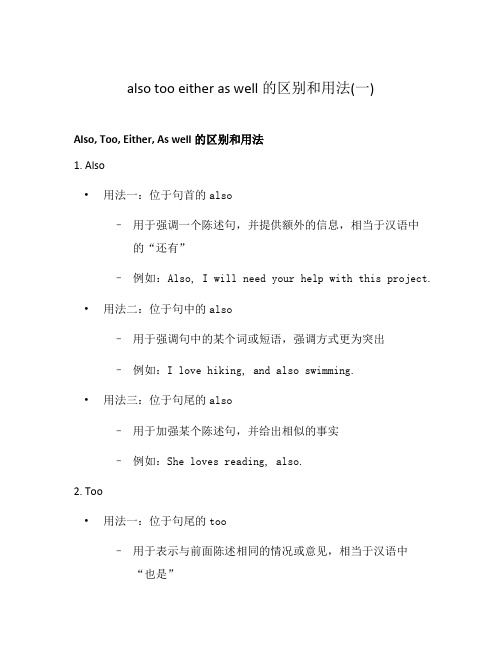
also too either as well的区别和用法(一)Also, Too, Either, As well的区别和用法1. Also•用法一:位于句首的also–用于强调一个陈述句,并提供额外的信息,相当于汉语中的“还有”–例如:Also, I will need your help with this project. •用法二:位于句中的also–用于强调句中的某个词或短语,强调方式更为突出–例如:I love hiking, and also swimming.•用法三:位于句尾的also–用于加强某个陈述句,并给出相似的事实–例如:She loves reading, also.2. Too•用法一:位于句尾的too–用于表示与前面陈述相同的情况或意见,相当于汉语中“也是”–例如:I am tired, too.•用法二:位于句中的too–用于强调句中某人或某物和其他人或物一样–例如:He, too, has a dog.3. Either•用法一:位于句尾的either–用于在否定句中表示两种选择中的任何一种–例如:I don’t like tea, either.•用法二:either…or…–用于表示两种选择之间的关系,相当于汉语中的“要么…要么…”–例如:You can either study or play games.4. As well•用法一:位于句尾的as well–用于表示除了前面提到的情况之外,还有另外一项–例如:I like cooking and gardening as well.•用法二:as well as–用于列举一系列事物时,表示“还有…以及…”–例如:He is good at playing soccer as well asbasketball.以上是also, too, either, as well的常见用法及区别。
通过合理运用这些词语,可以使你的表达更加准确明确。
初中英语副词too,either,also,so的区别
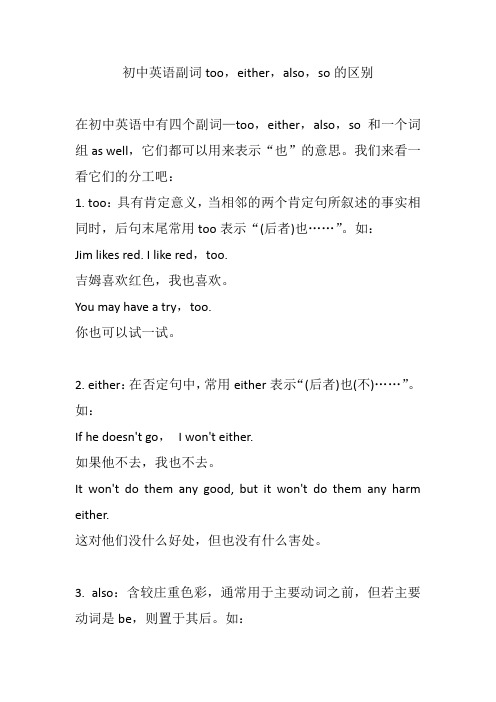
初中英语副词too,either,also,so的区别在初中英语中有四个副词—too,either,also,so和一个词组as well,它们都可以用来表示“也”的意思。
我们来看一看它们的分工吧:1. too:具有肯定意义,当相邻的两个肯定句所叙述的事实相同时,后句末尾常用too表示“(后者)也……”。
如:Jim likes red. I like red,too.吉姆喜欢红色,我也喜欢。
You may have a try,too.你也可以试一试。
2. either:在否定句中,常用either表示“(后者)也(不)……”。
如:If he doesn't go,I won't either.如果他不去,我也不去。
It won't do them any good, but it won't do them any harm either.这对他们没什么好处,但也没有什么害处。
3. also:含较庄重色彩,通常用于主要动词之前,但若主要动词是be,则置于其后。
如:They also agree with me.他们也同意我的意见。
I was also there.我也在那儿。
4. so:用于代替上文中的形容词、名词或动词,当一句话说完之后,接着一句用倒装结构,表示“(后者)也……”。
如:Mary is very happy and so is everyone else in her birthday party.在玛莉的生日宴会上,她非常高兴,其他人也非常愉快。
5. as well:常用于句末,意为“也;还”。
如:He speaks English, and he knows French as well.他说英语,也懂法语。
人教版初中英语as well, also, too 以及either高频考点、句型讲练
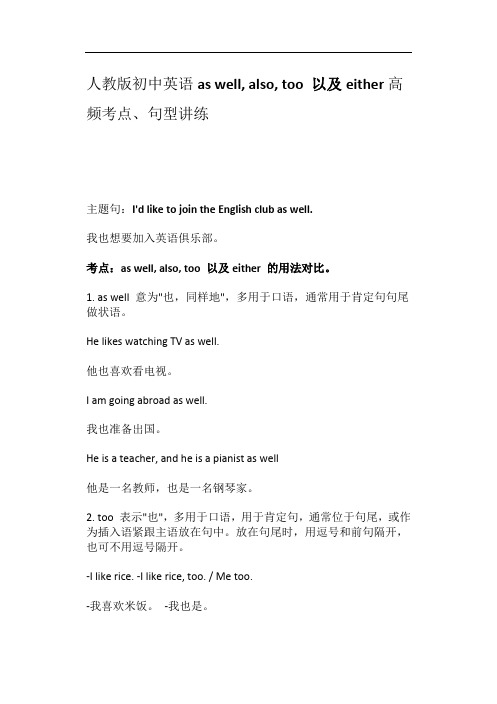
人教版初中英语as well, also, too 以及either高频考点、句型讲练
主题句:I'd like to join the English club as well.
我也想要加入英语俱乐部。
考点:as well, also, too 以及either 的用法对比。
1. as well 意为"也,同样地",多用于口语,通常用于肯定句句尾做状语。
He likes watching TV as well.
他也喜欢看电视。
I am going abroad as well.
我也准备出国。
He is a teacher, and he is a pianist as well
他是一名教师,也是一名钢琴家。
2. too 表示"也",多用于口语,用于肯定句,通常位于句尾,或作为插入语紧跟主语放在句中。
放在句尾时,用逗号和前句隔开,也可不用逗号隔开。
-I like rice. -I like rice, too. / Me too.
-我喜欢米饭。
-我也是。
also,too,either,neither,so,as well的用法

also,too,either,neither,so,as well的用法1.also副词“也,而且,并且”用于肯定句或疑问句,但一般位于句中,通常位于be动词,助动词或情态动词之后,行为动词之前。
如:He has been to Beijing. I have also been there.他去过北京,我也去过。
He is good at English. He is also good at Japanese.他擅长英语,也擅长日语。
We are also students.我们也是学生。
He also went there on foot.他也是走着去的。
Did you also want to have a look? 你也想看看吗?I also want some tea.我也要点茶。
2.too副词表示“也”,常用于肯定句或疑问,常和also相互替换,一般放在句末。
如:He studies hard and I study hard, too.他学习用功,我(学习)也用功。
He likes China, too.他也喜欢中国。
Are you in Grade 3, too? 你也在三年级吗?3. either①副词,“也不”用于否定句,而且只能放在句末。
如:He didn’t know it.I didn’t know it either.他不知道那件事,我也不知道。
She is not a Japanese, I’m not, either.她不是日本人,我也不是。
My sister doesn’t like this song, either.我妹妹也不喜欢这首歌。
②代词,两个中任意一个,(两者之)每一个,故作主语时谓语动词用单数。
如:Either of the books is new.这两本书任何一本都是新的.She doesn’t like either of the films.这两部电影她都不喜欢.③形容词, 用来修饰单数名词,意思与作代词时相同.如:Either school is near my home. (这两所学校中的)任何一所学校都离我家很近.Either question is difficult.两个问题(中的任何一个)都难.There are many flowers on either side of the street.街道两旁有许多的花。
(2021年整理)also,too,aswell,either的区别、用法及练习题(附答案)

also,too,aswell,either的区别、用法及练习题(附答案)编辑整理:尊敬的读者朋友们:这里是精品文档编辑中心,本文档内容是由我和我的同事精心编辑整理后发布的,发布之前我们对文中内容进行仔细校对,但是难免会有疏漏的地方,但是任然希望(also,too,aswell,either的区别、用法及练习题(附答案))的内容能够给您的工作和学习带来便利。
同时也真诚的希望收到您的建议和反馈,这将是我们进步的源泉,前进的动力。
本文可编辑可修改,如果觉得对您有帮助请收藏以便随时查阅,最后祝您生活愉快业绩进步,以下为also,too,aswell,either的区别、用法及练习题(附答案)的全部内容。
also, too, as well, either的区别、用法及练习题also, too,as well, either中文都有“也”的意思。
also, too,as well都只用在肯定句之中,只是在句中所用的位置不同.而either只用在1.also,用于肯定句中,表示“也”的意思。
如:Jane speaks French。
Sam also speaks French。
He loves chocolate. I also love pizza。
Frank can come with us。
Nancy can also come with us.also在句子中的位置,主要有四种情况:(1)放在be动词之后。
如:I am also Canadian.I was also there。
(2) 放在实义(行为)动词之前.如:I also sing。
He also helped us。
(3) 放在助动词、情态动词之后。
如:I have also been to Hong Kong.I am also studying economics.I can also speak French.I should also be there。
(2021年整理)also,too,aswell,either的区别、用法及练习题(附答案)

also,too,aswell,either的区别、用法及练习题(附答案)编辑整理:尊敬的读者朋友们:这里是精品文档编辑中心,本文档内容是由我和我的同事精心编辑整理后发布的,发布之前我们对文中内容进行仔细校对,但是难免会有疏漏的地方,但是任然希望(also,too,aswell,either的区别、用法及练习题(附答案))的内容能够给您的工作和学习带来便利。
同时也真诚的希望收到您的建议和反馈,这将是我们进步的源泉,前进的动力。
本文可编辑可修改,如果觉得对您有帮助请收藏以便随时查阅,最后祝您生活愉快业绩进步,以下为also,too,aswell,either的区别、用法及练习题(附答案)的全部内容。
also, too, as well, either的区别、用法及练习题also, too,as well, either中文都有“也”的意思。
also, too,as well都只用在肯定句之中,只是在句中所用的位置不同.而either只用在1.also,用于肯定句中,表示“也”的意思。
如:Jane speaks French。
Sam also speaks French。
He loves chocolate. I also love pizza。
Frank can come with us。
Nancy can also come with us.also在句子中的位置,主要有四种情况:(1)放在be动词之后。
如:I am also Canadian.I was also there。
(2) 放在实义(行为)动词之前.如:I also sing。
He also helped us。
(3) 放在助动词、情态动词之后。
如:I have also been to Hong Kong.I am also studying economics.I can also speak French.I should also be there。
英语中的三个也的区别和用法

英语中的三个也的区别和用法在英语中,有三个表示“也”的词,它们分别是"also","too" 和"as well"。
虽然它们的意思相似,但在用法上存在一定的区别。
下面我们将分析这三个词的区别和用法,以帮助我们更好地在句子中运用它们。
1."Also" 的用法"Also" 主要用于句子中的主语、谓语或宾语部分,表示“也”的意思。
它可以用在肯定句和否定句中,位置比较灵活。
例如:- She also plays the piano.(她也弹钢琴。
)- He doesn"t like sports, and also he prefers reading.(他不喜欢运动,而且他更喜欢阅读。
)2."Too" 的用法"Too" 通常用于肯定句中,表示“也”的意思。
它放在句子的末尾,用来强调也包含某个人或事物。
例如:- She is a talented artist.She is also a great musician.(她是一位有才华的艺术家,同时也是一位出色的音乐家。
)- I like apples.I also like oranges.(我喜欢苹果,我也喜欢橙子。
)3."As well" 的用法"As well" 用于肯定句中,表示“也”的意思。
它通常放在句子的末尾,用来补充说明某人或某事物的特点。
与"also" 相比,"as well" 的语气更弱。
例如:- He is a successful businessman.He is also a kind-hearted person.(他是一位成功的商人,他也是一个善良的人。
)- She can speak English fluently.She can also speak French quite well.(她英语说得流利,法语也说得相当好。
also。too。as well。either的区别、用法及练习题(附答案)

also。
too。
as well。
either的区别、用法及练习题(附答案)I am XXX.(不用逗号隔开)2)放在句子中间,用逗号隔开。
如:I am,too,XXX.She is,too,shy to speak in public.3.as well,用于肯定句中,表示“也”的意思。
如:Jane speaks French。
Sam XXX.I love chocolate。
I love pizzaas well.Frank can come with us。
Nancy can come with usas well.as well,在句子中的位置,一般放在句子末尾,用逗号隔开。
如:I am XXX.He is a doctor。
He is a XXX well.4.either,用于否定句中,表示“也”不。
“either。
or。
”表示“或者。
或者。
”。
如:I don’t speak French。
Sam doesn’tspeak French either.I don’t XXX XXX.Frank can’t come with us。
Nancy can’XXX.either在句子中的位置,一般放在助动词、情态动词之后,或者放在句子末尾。
如:I can’tspeak French。
I can’tspeak Spanish either.XXX.练题:1.______ of XXX.A。
AlsoB。
TooC。
As wellD。
XXX答案:B2.XXX,_____.A。
AlsoB。
TooC。
As wellD。
XXX答案:D3.I am studying Chinese。
I am studying Japanese,_____.A。
AlsoB。
TooC。
As wellD。
XXX答案:CXXX and his XXX。
I am XXX。
If he wants to join us。
he should meet us at 8:00.As a formal usage。
also too either as well的区别和用法

also too either as well的区别和用法摘要:1.介绍also, too, either 和as well 的含义和用法2.区分also, too, either 和as well 之间的差异3.提供实例说明这些词的用法4.总结这些词的用法和注意事项正文:一、also, too, either 和as well 的含义和用法1.also:用于肯定句中,表示“也”,“同样”2.too:用于肯定句中,表示“也”,“同样”3.either:用于否定句和疑问句中,表示“也不”,“任何一个”4.as well:用于肯定句和否定句中,表示“也”,“同样”二、区分also, too, either 和as well 之间的差异1.also 和too 的用法相似,都表示“也”,“同样”,但是also 用于较为正式的场合,而too 更常用于口语中。
2.either 用于否定句和疑问句中,表示“也不”,“任何一个”,而also 和too 只能用于肯定句中。
3.as well 用于肯定句和否定句中,表示“也”,“同样”,与also 和too 的用法类似,但是as well 可以放在句首、句中和句末。
三、实例说明这些词的用法1.also 的用法:I like apples and oranges.I also like bananas.(我也喜欢香蕉。
)2.too 的用法:She likes apples and oranges.She also likes bananas.(她也喜欢香蕉。
)3.either 的用法:I don"t like apples.I don"t like oranges either.(我也不喜欢橙子。
)4.as well 的用法:I like apples, oranges, and bananas as well.(我也喜欢香蕉。
)四、总结这些词的用法和注意事项1.also, too 和as well 的用法相似,都表示“也”,“同样”,但是它们在不同语境下的使用频率和场合有所不同。
also,too,either,aswell的区别

这四个副词均可表示“也”,区别如下:
1. too 和as well 多用于口语中,语气较轻,通常用于肯定句或疑问句,一般不用于否定句,且通常放在句末。
如:
I like you too [as well].
我也喜欢你。
Are they coming too [as well]?
他们也来吗?
too 有时也紧跟在主语后(注:as well 不这样用),此用法较正式。
如:I, too, know where he lives.
我也知道他住在什么地方。
在Me too, You too 这类简略答语中,通常不用as well, also。
如:
A:I’m tired. 我累了。
B:Me too. 我也是。
2. also 比too 和as well 正式,一般也不用于否定句,它在句中的位置通常是紧靠动词,即放在行为动词之前,特殊动词之后。
有时为了强调也放在句末(但不常见)。
如:
He also came. / He came also.
他也来了。
She is young and beautiful,and also rich.
她年轻漂亮,而且有钱。
also 有时用于句首(其后通常有逗号),相当于连词and。
如:
Also,his mother was dead.
再说,他母亲又过世了。
3. either(也)通常只用于否定句,且要放在句末。
如:
I don’t know, either.
我也不知道。
He hasn’t finished it,either.
他也还没有做完。
also--too--as-well--either的区别、用法及练习题(附答案)

also,too, as well,either的区别、用法及练习题1.also,用于肯定句中,表示“也"的意思。
如:Jane speaks French. Sam also speaks French。
He loves chocolate. I also love pizza.Frank can come with us. Nancy can also come with us.also在句子中的位置,主要有四种情况:(1) 放在be动词之后。
如:I am also Canadian。
I was also there。
(2) 放在实义(行为)动词之前。
如:I also sing。
He also helped us。
(3) 放在助动词、情态动词之后.如:I have also been to Hong Kong.I am also studying economics。
I can also speak French。
I should also be there.(4) 放在句首,用逗号隔开,表示强调。
如:It’s very humid. Also, you can easily get sunburnt.It is a small house。
Also,it needs a lot of repairs.2.too,用于肯定句中,表示“也”的意思。
如:Jane speaks French。
Sam speaks French too。
I love chocolate。
I love pizza too.Frank can come with us。
Nancy can come with us too。
too, 在句子中的位置,主要有两种情况。
如:(1)放在句子末尾,可以用逗号隔开,也可以不用逗号隔开.如:David is a teacher。
His wife is a teacher, too. (用逗号隔开)David is a teacher。
also, too, either和as well的区别

also, too, either和as well的区别He bought a computer,but she didn’t,.A.EitherB.TooC.Also(“他也买了电脑,但她没有也买电脑”,你选哪个答案?)下面这个句子要表达“他也买了一台电脑,但是她没有也买一台”这个意思,句中的两个“也”分别该用哪一个词,你能准确地选择出来吗?He _____ bought a computer, but she didn't, _____.A. eitherB. tooC. alsoD. as well我敢保证,90%以上的同学上面的第二空会选错,因为你会选A!那你当然就错了。
also, too, either 和as well这四个词都有“也”的意思,它们的区别在于:1. too 和as well 多用于口语中,语气较轻,通常用于肯定句或疑问句,一般不用于否定句,且通常放在句末。
如:(1)I like you too.(= like you as well.)我也喜欢你。
(肯定句)(2)Are they coming too?(=Are they coming as well?)他们也来吗?(疑问句)2、too放在句末时,too前面可以加上逗号,也可以不加逗号,但as well前面不加逗号。
如:(1)I like you, too. 我也喜欢你。
(正确)(2)I like you, as well. 我也喜欢你。
(错误)3、too有时也紧跟在主语后,这时它的前后都会用逗号与原句隔开,也就是说,too是作为一个插入语放在主语后面的,此用法较正式。
但as well不能这样使用。
如:I, too, know where he lives. 我也知道他住在什么地方。
also的同义词辨析
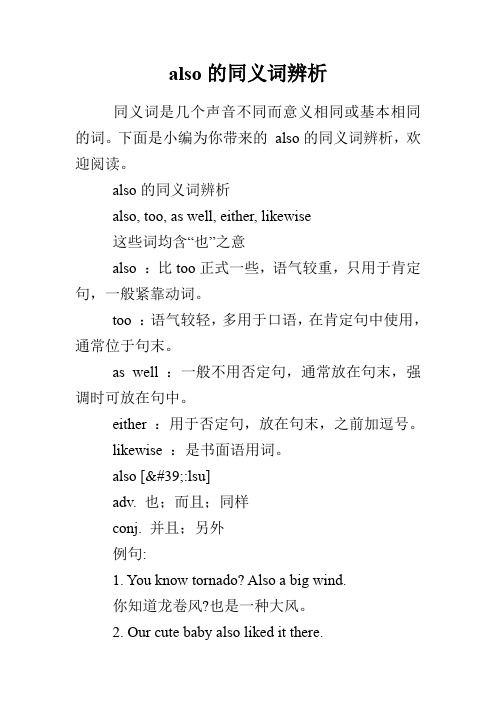
also的同义词辨析同义词是几个声音不同而意义相同或基本相同的词。
下面是小编为你带来的also的同义词辨析,欢迎阅读。
also的同义词辨析also, too, as well, either, likewise这些词均含“也”之意also :比too正式一些,语气较重,只用于肯定句,一般紧靠动词。
too :语气较轻,多用于口语,在肯定句中使用,通常位于句末。
as well :一般不用否定句,通常放在句末,强调时可放在句中。
either :用于否定句,放在句末,之前加逗号。
likewise :是书面语用词。
also [':lsu]adv. 也;而且;同样conj. 并且;另外例句:1. You know tornado? Also a big wind.你知道龙卷风?也是一种大风。
2. Our cute baby also liked it there.我们可爱的宝贝也喜欢那里。
too [tu:]adv. 太;也;很;还;非常;过度例句:1. He is young, clever and rich too.他年轻、聪明,还富有。
2. And you work out at home, too!而且你在家里也做健身运动!either ['ai, 'i:-]adj. 两者之中任一的;两者之中每一的prep. 任何一个conj. 或者adv. 也(用于否定句或否定词组后);[口]根本例句:1. The fruit of either of these plants.广泛分布的植物和果类害虫。
2. You can learn either singing or dancing.你可以学唱歌也可以学跳舞。
as-well-either-also-too的区别

as well, either, also, too的区别用于肯定句,既可表示两人干了同样的事,也可表示一个人干了两件事,通常位于be动词,助动词或情态动词之后,行为动词之前。
如:He has been to Beijing. I have also been there.他去过北京,我也去过。
He is good at English. He is also good at Japanese.他擅长英语,也擅长日语。
I also wants some tea.我也要点茶。
注意:表示强调时,also也可放在助动词或情态动词等之前。
比较:I can also do it.我也能干。
I also can do it.(同上)也用于肯定句,比also更通俗,和also, as well可以相互替换,可放在句中,也可放在句末。
如:Xiao Li went to Beijing and Xiao Zhao, too, went to Beijing.小李到北京去了,小赵也到北京去了。
He studies hard and I study hard, too.他学习用功,我(学习)也用功。
用于否定句,而且只能放在句末。
如:He didn’t know didn’t know it either.他不知道那件事,我也不知道。
I can’t speak French and can’t write it, either.我不会讲法语,也不会写法语。
well在口语中用得很多,用法和too完全一样,可以互换,通常位于句末。
[见as well, as well as条]。
如:She not only sings,she plays the piano as well.她不但会唱歌,而且会弹钢琴。
I can do it as well.这事我也能做。
5.在含有责备、抱怨或规劝之类的句子中,若句子本身是以否定的形式表达肯定的意义时用“too”,而不用“either”。
最新also--too--as-well--either的区别、用法及练习题(附答案)资料

also, too, as well, either的区别、用法及练习题1.also, 用于肯定句中,表示“也”的意思。
如:Jane speaks French. Sam also speaks French.He loves chocolate. I also love pizza.Frank can come with us. Nancy can also come with us.also在句子中的位置,主要有四种情况:(1) 放在be动词之后。
如:I am also Canadian.I was also there.(2) 放在实义(行为)动词之前。
如:I also sing.He also helped us.(3) 放在助动词、情态动词之后。
如:I have also been to Hong Kong.I am also studying economics.I can also speak French.I should also be there.(4) 放在句首,用逗号隔开,表示强调。
如:It’s very humid. Also, you can easily get sunburnt.It is a small house. Also, it needs a lot of repairs.2.too, 用于肯定句中,表示“也”的意思。
如:Jane speaks French. Sam speaks French too.I love chocolate. I love pizza too.Frank can come with us. Nancy can come with us too.too, 在句子中的位置,主要有两种情况。
如:(1)放在句子末尾,可以用逗号隔开,也可以不用逗号隔开。
如:David is a teacher. His wife is a teacher, too. (用逗号隔开)David is a teacher. His wife is a teacher too. (不用逗号隔开)I can speak French too.I am studying economics too.If he wants to go too, he should meet us at 8:00.(2)插入句子中。
also, too, as well, either的区别、用法及练习题(附答案)

also, too, as well, either的区别、用法及练习题1.also, 用于肯定句中,表示“也”的意思。
如:Jane speaks French. Sam also speaks French.He loves chocolate. I also love pizza.Frank can come with us. Nancy can also come with us.also在句子中的位置,主要有四种情况:(1) 放在be动词之后。
如:I am also Canadian.I was also there.(2) 放在实义(行为)动词之前。
如:I also sing.He also helped us.(3) 放在助动词、情态动词之后。
如:I have also been to Hong Kong.I am also studying economics.I can also speak French.I should also be there.(4) 放在句首,用逗号隔开,表示强调。
如:It’s very humid. Also, you can easily get sunburnt.It is a small house. Also, it needs a lot of repairs.2.too, 用于肯定句中,表示“也”的意思。
如:Jane speaks French. Sam speaks French too.I love chocolate. I love pizza too.Frank can come with us. Nancy can come with us too.too, 在句子中的位置,主要有两种情况。
如:(1)放在句子末尾,可以用逗号隔开,也可以不用逗号隔开。
如:David is a teacher. His wife is a teacher, too. (用逗号隔开)David is a teacher. His wife is a teacher too. (不用逗号隔开)I can speak French too.I am studying economics too.If he wants to go too, he should meet us at 8:00.(2)插入句子中。
- 1、下载文档前请自行甄别文档内容的完整性,平台不提供额外的编辑、内容补充、找答案等附加服务。
- 2、"仅部分预览"的文档,不可在线预览部分如存在完整性等问题,可反馈申请退款(可完整预览的文档不适用该条件!)。
- 3、如文档侵犯您的权益,请联系客服反馈,我们会尽快为您处理(人工客服工作时间:9:00-18:30)。
also, too, either, as well的区别这四个副词均可表示“也”,区别如下:1.too 和as well 多用于口语中,语气较轻,通常用于肯定句或疑问句,一般不用于否定句,且通常放在句末。
如:I like you too [as well]. 我也喜欢你。
Are they coming too [as well]? 他们也来吗?too 有时也紧跟在主语后(注:as well 不这样用),此用法较正式。
如:I, too, know where he lives. 我也知道他住在什么地方。
在Me too, You too 这类简略答语中,通常不用as well, also。
如:A:I’m tired. 我累了。
B:Me too. 我也是。
as well意为“也,又,而且”,意思等同于too,also,但as well只能置于句末。
He speaks English and Spanish as well.他既能说英语, 也能说西班牙语。
There may be travel expense, as well.可能还有旅途费用。
Are they coming as well?他们也来吗?as well也, 还有He speaks English and Spanish as well.他既能说英语, 也能说西班牙语。
2.also 比too 和as well 正式,一般也不用于否定句,它在句中的位置通常是紧靠动词,即放在行为动词之前,特殊动词之后。
有时为了强调也放在句末(但不常见)。
如:He also came. / He came also. 他也来了。
She is young and beautiful,and also rich. 她年轻漂亮,而且有钱。
also 有时用于句首(其后通常有逗号),相当于连词and。
如:Also,his mother was dead. 再说,他母亲又过世了。
3.either(也)通常只用于否定句,且要放在句末。
如:I don’t know, either. 我也不知道。
He hasn’t finished it,either. 他也还没有做完。
注:有时在肯定句之后跟一个否定句,可能用too,also。
如:He came, but she didn’t also came. 他来了,但她没有也一起来。
He went to Washington, but not to New York too. 他去了华盛顿,但并不是也去了纽约。
比较:He didn’t buy a computer, and she didn’t either. 他没有买电脑,她也没有买。
He bought a computer, but she didn’t too. 他买了台电脑,但她没有也买台电脑。
as well相当于too和also,但要注意与too,also,either的区别。
as well通常用于肯定句中,一般置于句尾,不能用逗号与其前面的词隔开;too通常用于肯定句中,一般置于句尾,且通常用逗号与其前面的词隔开;also通常用于肯定句中,一般置于句中;either通常用于否定句或疑问句中,一般置于句尾。
如:He is a pianist,and he is a singer as well.He is a pianist,and he is a singer,too.He is a pianist,and he is also a singer.He isn’t a pianist,and he isn’t a singer either.联想拓展as well as意为“不仅……而且……,既……又……;除了……之外,还有……;和……一样好”。
as well as作介词用时,意思等同于besides,意为“除……之外”,后跟动词时通常用v.-ing 形式。
as well as连接主语时,谓语动词的单复数形式取决于as well as前面主语的单复数形式。
may/might as well do意为“不妨……;还是……好”。
Are you coming as well?=Are you coming, too?=Are you also coming?你也来吗?They sell books as well as newspapers.他们既卖报纸也卖书。
She cooks as well as her mother.她做菜跟她妈妈做得一样好。
His wife as well as his children was invited to the party.不仅他的孩子,连同他妻子也被邀请参加那次聚会。
We may/might as well ask him for some advice.我们不妨向他征求一些建议。
高手过招单项填空①Jack plays football , if not better than David.A. as wellB. as well asC. so wellD. so well as②E-mail, as well as telephones, an important part in daily communication.A. is playingB. have playedC. are playingD. play解析:①选B。
as well as意为“和……一样好”。
“if not+better than”是一个插入语,去掉后,句子是Jack plays football as well as David。
②选A。
当as well as连接主语时,谓语动词的单复数形式取决于前面的主语的单复数形式。
as welleg: I can swim as well.辨析:as well, also, too, either(1) as well : 用于肯定句,只用于句尾。
He plays the piano as well.(2) also: 用于肯定句,用在句中。
He also plays the piano.(3) too: 用于肯定句,用在句尾,一般用逗号与其他部分分开。
He plays the piano, too.(4) either: 用于否定句中。
He doesn't play the piano either.拓展:as well as 如同…一样好;既…又…;不但…而且…(1)连接两个主语时,其谓语动词的形式应根据前一个主语确定。
此外,还有together with , along with, besides, but, except, including, rather than 等也属此种情况。
(2)不能用“ A,B as well as C " 结构,但可用" A as well as B and C " or " A and B as well as C " 结构。
eg: 1) The teacher as well as some students was interested in the question.= Not only some students but also the teacher was interested in the question.2) I play tennis as well as he .3) She sings as well as playing the piano.4) As well as visiting the Great Wall, we spent a day in Beijing.5) He speaks Spanish and English as well as French.6) She knows me as well as him.also的用法also用于实义动词之前▲also用于实义动词之前They also agree with me.他们也同意我的看法。
I also began to be interested in crickets.我也开始对板球运动感到兴趣。
also用于be动词之后▲also用于be动词之后I was also there.我也在那儿。
He is also an American.他也是美国人。
also用于第一个助动词之后▲also用于第一个助动词之后His sister has also gone to town.他的妹妹也到镇里去了。
The leisure center has also proved uneconomic.休闲中心业已证明利润不大。
also有时放在句首▲also有时放在句子的最前Also, some students were tempted to add written comment of their own throughout the paper.一些学生也冒险通过论文写出他们自己的评论。
I thought it was the perfect answer. Also, Tony and I had never done a historical subject.我认为它是完美的答案。
而且,托尼和我从没有作过历史科目。
also不能放在句末might as well的意思为“还是……为好”,相当于may/just as well。
要注意不能与as well as,as well混淆。
如:Today you might as well go to school, or your teacher will criticise you.今天你还是去上学的好,要不然的话,你的老师会批评你的。
[巩固练习]用所给的动词的适当形式填空。
1. Mary as well as her classmates ___________(be) going to visit the museum next week.2. Neither Lucy nor her sisters ___________(have) been to Beijing so far.3. Either your students or Mr. Wang ___________ (know) this.4. Not only his brother but also his sisters ___________(hurt) in the accident.5. Not his classmates but he often ___________ (help) the blind man.6. Mary, together with her parents ___________(have) been watching TV tonight.[参考答案]1. is2. have3. knows4. were hurt5. helps6. has。
